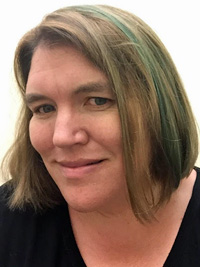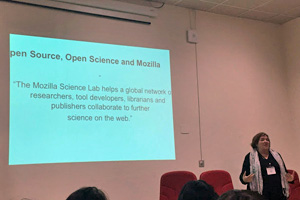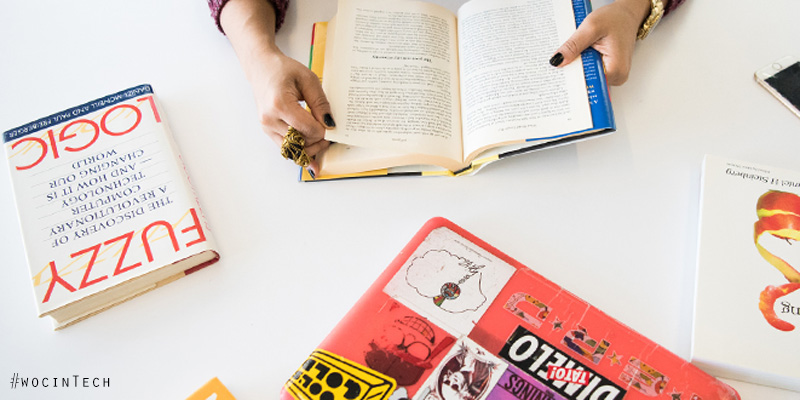Larissa Brown Shapiro is head of global diversity and inclusion at Mozilla. She works to diversify the open Internet and her areas of interest include diversity, inclusion, equity, open tech, queerness and autism. She has recently attended MozFest in London.

“…We build our browser for people, not for profit…”
Serving human dignity and human connection
My career has had quite a winding path. I would say looking back on it that my guiding star, aside from doing what would support my family, has been doing what I felt would serve human dignity and human connection.
I started out with a degree in women’s studies and feminist theory, and then after leaving my Master’s programme, I went into technology – it was the mid-90s and the Internet felt to me like an amazing democratising force. I’d learned basic web development in college, and I was so privileged to find a first manager who trusted my abilities and hired me on potential.
Over time, I moved from web developer / Perl hacker to programme manager and then into open source, first as the product manager for BIND [Berkley Internet Name Domain], and then to Mozilla, where I was in more engineering side roles for three years before moving to my role leading diversity and inclusion.
My role on a day to day basis
I lead global diversity and inclusion strategy and programmes at Mozilla. That means that I work across the organisation building both accountability and action toward greater diversity of and inclusion of Mozillians. I lead research (with our consultants and partners) into how diverse and inclusive Mozilla is, and help the organisation use that research to measure progress, and I build programs that help us make progress.
Background to Mozilla and its ethos for accessibility through open source
Mozilla is a global non-profit Internet advocacy organisation and is the creator of the Firefox web browser. We build our browser for people, not for profit – and we consider a fundamental part of why we exist is to build an Internet that is safe and accessible for all – and that all can contribute to.
Digital inclusion is important because technology is far too useful, powerful, dangerous, and interesting to be left in the hands of an elite few to design.
Why digital inclusion is particularly crucial for women

Women globally are underrepresented among our technical staff at Mozilla, but also across the tech industry and as users and builders of the Internet more widely. I look at gender intersectionally, so I’m concerned about experiences of people along axes of gender, race, age, class, orientation, religion, nationality, introversion vs extroversion, ability, neurodiversity etc. But throughout every intersection, women struggle more to be included in digital life. Women are currently left out of many digital engagements and conversations.
MozFest in London
MozFest is our annual festival and celebration of Internet health and openness. We have been running it out at Ravensbourne college for eight years. To quote the executive director of the Mozilla Foundation, Mark Surman,
“Our sessions, speakers and workshops are built to foster collaboration across disciplines, borders and continents. We’re ready to face the biggest issues of the day – from fake news and online harassment to global cyberattacks – together, with an eye toward practical, open source solutions.
“The challenges we’re facing are sizable. But we’re prepared to roll up our sleeves and address them head on in London – then return to our communities, classrooms and computers, better equipped to defend the Internet as a global public resource.”
Trends at the event
One thing I saw a deep commitment to, and I’m seeing a lot of commentary about, is making sure a deep diversity of people is represented both on stage and in the interactive sessions across all eight of our topic areas. We reinforce this with strong community participation guidelines about *how* we treat each other – these guidelines are a core part of my work and one of the ways I contribute to the festival is in how these guide lines are built into and upheld by the festival.
Also, I saw a lot of commentary about the role of Internet activism in or with government, including how to navigate that in a range of contexts where you might disagree with the actions government is taking.
Coming up next
What we’re up to now is evolving the diversity and inclusion strategy further. That means revising our goals, building more accountability, and offering more education in the staff and community. It means our new Inclusive Leadership programme, where we build our leaders’ skills in inclusion and growing diverse teams, and the Voice and Influence Circles programme where we equip staff with the ability to navigate gender bias at work.
We are building more partnerships in a broad diversity of community organisations, and also supporting research in the world of inclusion, both through academic consortiums like the Clayman Institute at Stanford or the Canadian ESS programme, and also through some of the projects in the Mozilla Research Grant initiative. We’re also pushing hard on getting our Community Participation Guidelines really understood and acted upon throughout our global community.
https://www.mozilla.org/en-GB/
https://twitter.com/larissashapiro
https://www.facebook.com/mozilla





